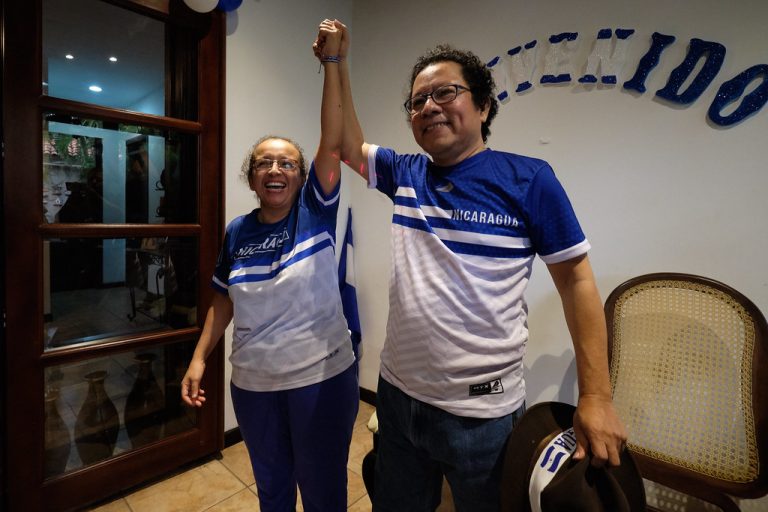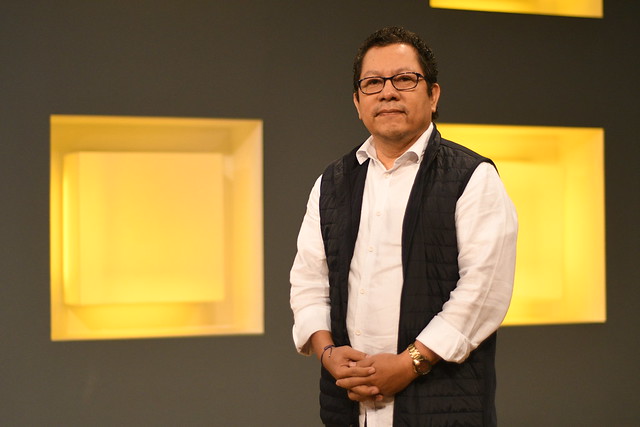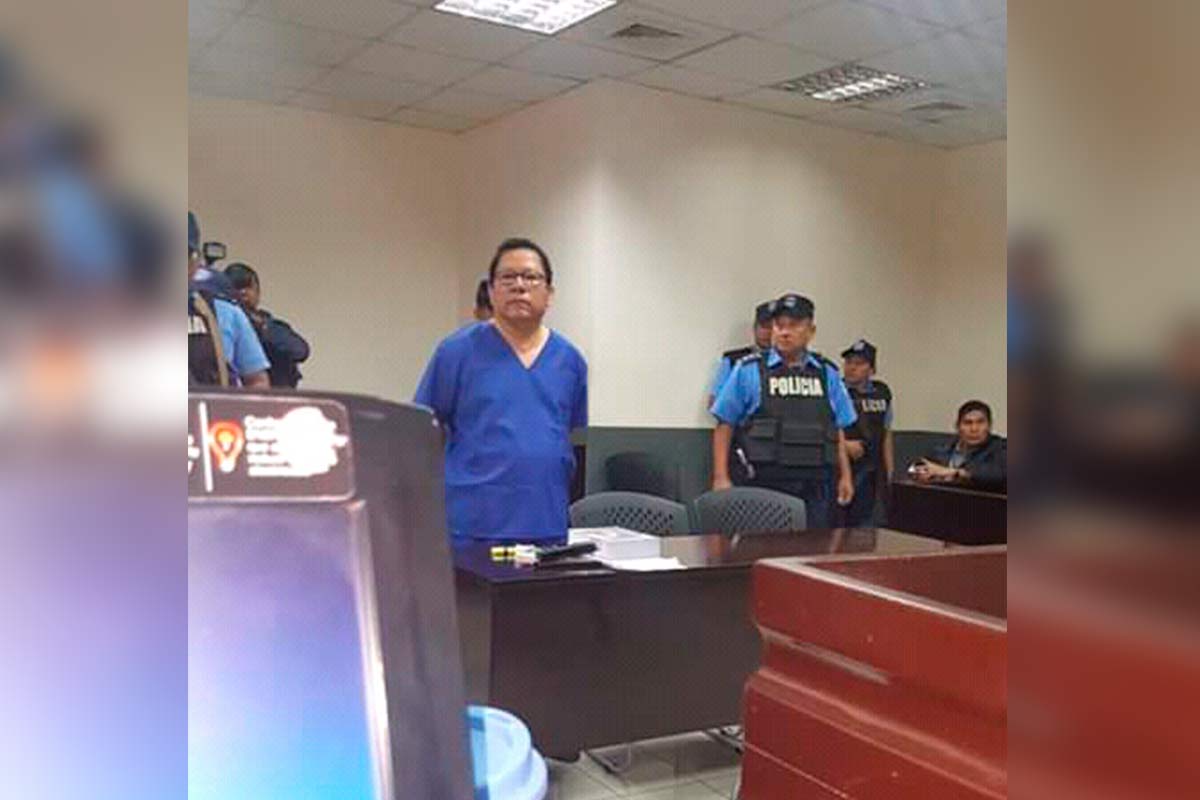27 de septiembre 2019

Children of Exile: The Births “Sowing Hope” in the Camp of Nicaraguan Farmers

PUBLICIDAD 1M
PUBLICIDAD 4D
PUBLICIDAD 5D
The political prisoners are leaders with determination to struggle for public office through free elections

Journalists Miguel Mora and Lucia Pineda Leave Jail to “Continue Informing”.
Reporter Miguel Mora, director of cable news channel 100% Noticias, was imprisoned for 172 days in maximum security in the El Modelo penitentiary outside of Managua. “That is the most horrendous thing that could happen to a human being. They bury you alive to destroy you morally, to break you, so your thoughts and principles change in their favor,” says Mora, with seriousness.
He remembers his dark hours in prison: “I wanted to throw myself against the walls because I wanted to get out and yell, because there nobody pays attention to you. What I did was fall to my knees and pray and ask the holy spirit to help me or otherwise I couldn’t take it. It’s normal that a person gets this way. If it weren’t for God, I would’ve lost my mind.”
Along with Lucia Pineda Ubau, the channel’s news director, they were submitted to a political trial accused of alleged crimes of “incitement to hatred”, “conspiring” and “terrorism.” “I was imprisoned for doing journalism, not for politics,” claims Mora. Even though he hasn’t recovered his freedom totally and his station building is still illegally confiscated and occupied by the police, he is transmitting through social networks, preparing to relaunch 100% Noticias. “It’s a matter of decision, we will not accept censorship,” he insists.
In this interview for the TV program Esta Semana, Miguel Mora also speaks about the leadership of former political prisoners involved in organizing the civic struggle and eventual free elections in which some will run for public offices. In spite of the permanent harassment he’s experiencing under the regime’s de facto martial law, he speaks with optimism about political change that is being constructed in Nicaragua: “We are all fearful, however we must control it because they’re betting on paralyzing us with fear.”
Many people ask, why the rancor, the viciousness, the persecution against Miguel Mora, Lucia Pineda, Veronica Chavez and 100% Noticias?
Miguel Mora: Without expecting it, we turned into the banner of freedom of the press in Nicaragua. The 100% Noticias’ format, the bravery and the decision to inform about what was happening. We decided to tell the truth and transmit in live and direct. The channel was equipped for live transmissions from any place on the streets. And a master that could gather all the information people were collecting through their cellphones of the massacre and the repression. We became the news center that gathered all of that and would broadcast through cable at a national level and by satellite and the digital platform. All of that, 24 hours a day for eight months, created citizen awareness and the blockade and censorship the regime thought they were going to impose before, during and after ended up being a failure because they lost the battle for public opinion. The people know the truth.
Before the April Rebellion they considered 100% Noticias a partial ally, half friend. In fact, there are statements from Ortega praising the work you did. What changed?
Nothing changed. They changed. When they were opposition and liberalism was declaring Sandinismo a dangerous ideology and Sandinistas were third class citizens, 100% Noticias gave coverage to the FSLN in opposition. When Aleman left office and there was persecution from Enrique Bolaños government and the PLC’s liberalism goes through the same, with good reason or not, we gave liberalism an opportunity on our station. And when the FSLN returns to power, we maintained a balanced editorial line.
However, as spaces of freedom were being closed, when they quit allowing us into press conferences, when they blackmailed us, when they would call us in to meetings, we started diversifying voices within the channel, because the voices on the other channels were being shut down. Then the channel became the voice of opposition and of independent journalism, but still inclusive of the government. When they break away from morality and start killing people, when they decided to shoot to kill and we see dead youths with shots in the head, neck and thorax, we said there was no reason for this and we took on a strong position and an editorial decision to be on the side of the victims and the people.
Did the regime expect unconditional alignment? Have you at any time been accused of political treason?
I have never been a member of the FSLN, I have been a journalist and the most they can say about me is that I’m from the center-left. But definitely a democratic journalist and citizen of Nicaragua. Our editorial line has been very balanced since the channel’s foundation. This has been the main asset for our journalism, to be balanced, listen to all sides. They were grateful for that coverage when they were in the opposition and didn’t have very much media, they tried to make us an allied media, however, I was straight forward with them that we are a professional and independent media.
They have never accused me of treason because I never was in the FSLN militancy, never was a public employee. If my wife, or Lucia or I as the leaders of 100% Noticias would’ve decided to be silent and surrender before the threats, then we would’ve betrayed the people of Nicaragua and we are never going to do that.
While you were in prison, you and Lucia, represented a symbol of freedom not only for us Nicaraguan journalists, but also for journalists around the world. What did that experience leave you, that imprisonment in isolation?
That is the most horrendous thing that can happen to a human being. They bury you alive. It’s a system to tear you apart spiritually, morally, to break you, so your thoughts and principles change in their favor. It was a very painful process. I had never been imprisoned in my life, and to get moved to a high security regime where they bury you with criminals, rapists and serial killers and other political prisoners. It can drive you crazy.
One time I couldn’t take the confinement because it’s a matchbox, it’s a tomb, they don’t only close you up with a thick metal door, but also screw in three types of screws and you’re sealed in. I wanted to throw myself against the walls because I wanted to be let out and yell, because there nobody pays attention to you. What I did was fall down on my knees and started praying and asking the holy spirit to help me otherwise I couldn’t take it anymore. It’s not normal that a person is like that. If not for God I would’ve lost my mind.

Miguel Mora, journalist and former political prisoner. Photo: Elmer Rivas / Confidencial
Are you free at the moment? What is the situation of your judicial process and the process against 100% Noticias?
I am physically free. The arbitrary and illegal accusation has not been closed by the judge. It’s in a limbo illegally and unconstitutionally invented. There are no travel restrictions against me, however my accounts and my channel have been confiscated. If one goes and tries to enter, you are confronted by a barrier of paramilitaries and riot police. There’s no legal support to keep my media confiscated. They accused us of being information terrorists, that is why they ordered we be taken out of the cable system, they took away our broadcast frequency and took over our media. It’s a dictatorial decision that violates national laws, constitutional rights and human rights worldwide.
Since you were released from prison you’ve gone back to directing the program Cuarto Poder (Fourth Power). Lucia is in San Jose producing 100% Noticias through the social networks. Can your media come back on the air, transmitting on other platforms in spite of the confiscation?
We do not accept censorship; we will never submit to censorship. If we have, like your father, Pedro Joaquin Chamorro would say, a public plaza, a street, a microphone, we will say what we want to say and with freedom of expression, because freedom lives within us, no matter how illegal they want to be.
Therefore, we have a strong digital platform with millions of followers and that is why we have decided to not wait for them to change their opinion or be forced by national and international pressure, when their media start getting sanctioned. We have a platform and what we do is battle from there and (continue) growing. If we have to start a new channel, we will. Because the most important thing about media is not its infrastructure nor its technological means, it’s the credibility above all if it’s a 24-hour media.
The political prisoners’ leadership
You’re a journalist, but also a former political prisoner, which has a new political connotation at this moment in the struggle. Can the journalist be separated from the political and the political from the journalist?
I’m a journalist and I was imprisoned for doing journalism, not politics. We were imprisoned because we inform, because we refuse censorship. It wasn’t because we organized anything. We gave coverage to the political expressions and the people’s decision to rebel against injustice and systematic repression of massacres. I continue to be a journalist.
But the consequence of that imprisonment for doing journalism makes me a former political prisoner. And the political prisoners are a force that has influence in national life.
I believe I’m a prisoner of conscience who was catalogued as political, and I’m honored. However, that wasn’t why I was imprisoned, it was because I was carrying out my profession and defending my people’s freedoms. I am a prisoner of conscience. If the people, after that placed us in a place of sympathy because they consider that we assumed the consequences of our actions, we were coherent, we were upright, I think we should use this to defend freedom of press, because without that freedom we cannot defend any other freedom. Even if they disappear us, confiscated us, the decision to continue informing, even if it’s by shouting in the streets or public plazas, has been made. Neither the censorship nor the dictatorship are going to change this.
Beyond your determination to continue doing journalism and defending freedom of press, the former political prisoners are doing political advocacy, some are in the Civic Alliance, others in UNAB, others in both, but the people identify them through a particular political identity.
We are leaders, in my case a leader of opinion. There are peasant leaders who were political prisoners and university leaders were political prisoners. They all are involved in what we have to do. In my case in the means of communication, and in the struggle to recover 100% Noticias. Medardo from the peasant sector is organizing, he’s a leader from the peasant sector. The university students have gone out to organize and generate peaceful resistance. And so we are in different sectors, but that is not an ideological or party connotation. It is a decision to be leaders and do the work that we need to do to restore democracy and the state of law in Nicaragua as soon as possible, from the place where each one of us belongs.

Miguel Mora, director of 100% Noticias, presented in the Courts of Managua, twelve hours after his abduction. Photo: Archive/Courtesy
There is a proposal for a minimum program of government, for electoral reforms, for the creation of a national opposition coalition to go to free elections. In this context, yourself, the political prisoners, visualize a particular role you could play?
Yes, it’s a consensus. If it depends on us to run for public offices, and I’m referring to mayors, city councils and above all in the National Assembly, we have to spearhead it because there are more than eight thousand offices of popular election and we need to present candidates. The political prisoners or former prisoners are decent, upright people that don’t see politics as a way to become rich, but as a service to the population. We have to get involved in politics because politics is too important to leave in the hands of criminals, assassins and corrupt people who have control over the arms, of the different State powers.
So, are we going to go to elections so they can continue to hand out offices and in a few years do the same thing over again? I think we have to take politics seriously. We should erase this culture of corruption, illegality and serve the people, for a certain period, not make it a career, then leave it for the next generation and educate them so that we continue in the democratic process for about fifty, a hundred years and forget about dictatorships.
How do you see that expectation of change now that the dictatorship has declared a total closing with the Civic Alliance? Are there conditions in the country to generate enough national and international political pressure under the state of siege we are experiencing?
Yes, there is. An example is myself and the political prisoners who are doing their work in a civic, peaceful and transparent way amidst the harassment. We all are afraid, but we have to control the fear because they are betting on paralyzing us with fear. I think the national leadership has to return to the country taking advantage of the impasse because the dictatorship cannot continue killing like it did last April. The eyes of the world are upon them.
Even if they invent lies, they don’t convince anyone and know that the time is coming for sanctions to businesses and ministers and legislators and corrupt judges and prosecutors and police officers who will have to face the consequences. If they don’t think things over and seek a negotiated way out between both parties, which has to be free, transparent and early elections so the people can elect their new government, there will be no solution to the economic catastrophe.
Could the Ortega regime stay longer, indefinitely, as has happened with the Maduro regime in Venezuela or in Syria and with other authoritarian regimes that manage to crush those demands for change?
Or it won’t. Since April 18 (2018) I was surprised. I never expected this. We were surprised, the people reacted, the youth rose up and the people today are more informed, have a citizen’s awareness and no longer want to continue in this environment. Anything could happen in this country and it’s not that someone will organize it, the people of Nicaragua simply have aspirations of freedom. Anything can happen.
You also know Ortega. Do you think after everything that has happened, he has any capacity to gage reality and understand that his exit is the only thing that could facilitate a change without greater suffering and without the country going economically broke?
He is afraid. If he loses power he loses it all, money, what his family has and what those closest to him have. His strategy is to win as much time as possible. They already know that with free and transparent elections they will leave power forever. They want to stretch out the period. And he’s decided to do this by systematically killing, repressing our freedoms and exhibiting himself to the rest of the world as what they are: killers, dictators and in a cowardly way, because the people are unarmed. He is afraid and the Sandinistas that follow him should also be.
Archivado como:
PUBLICIDAD 3M
Periodista nicaragüense, exiliado en Costa Rica. Fundador y director de Confidencial y Esta Semana. Miembro del Consejo Rector de la Fundación Gabo. Ha sido Knight Fellow en la Universidad de Stanford (1997-1998) y profesor visitante en la Maestría de Periodismo de la Universidad de Berkeley, California (1998-1999). En mayo 2009, obtuvo el Premio a la Libertad de Expresión en Iberoamérica, de Casa América Cataluña (España). En octubre de 2010 recibió el Premio Maria Moors Cabot de la Escuela de Periodismo de la Universidad de Columbia en Nueva York. En 2021 obtuvo el Premio Ortega y Gasset por su trayectoria periodística.
PUBLICIDAD 3D